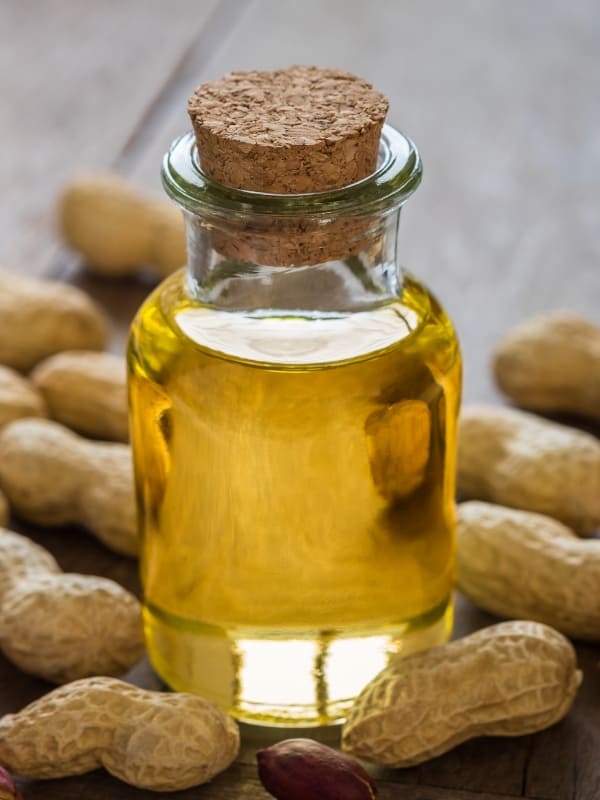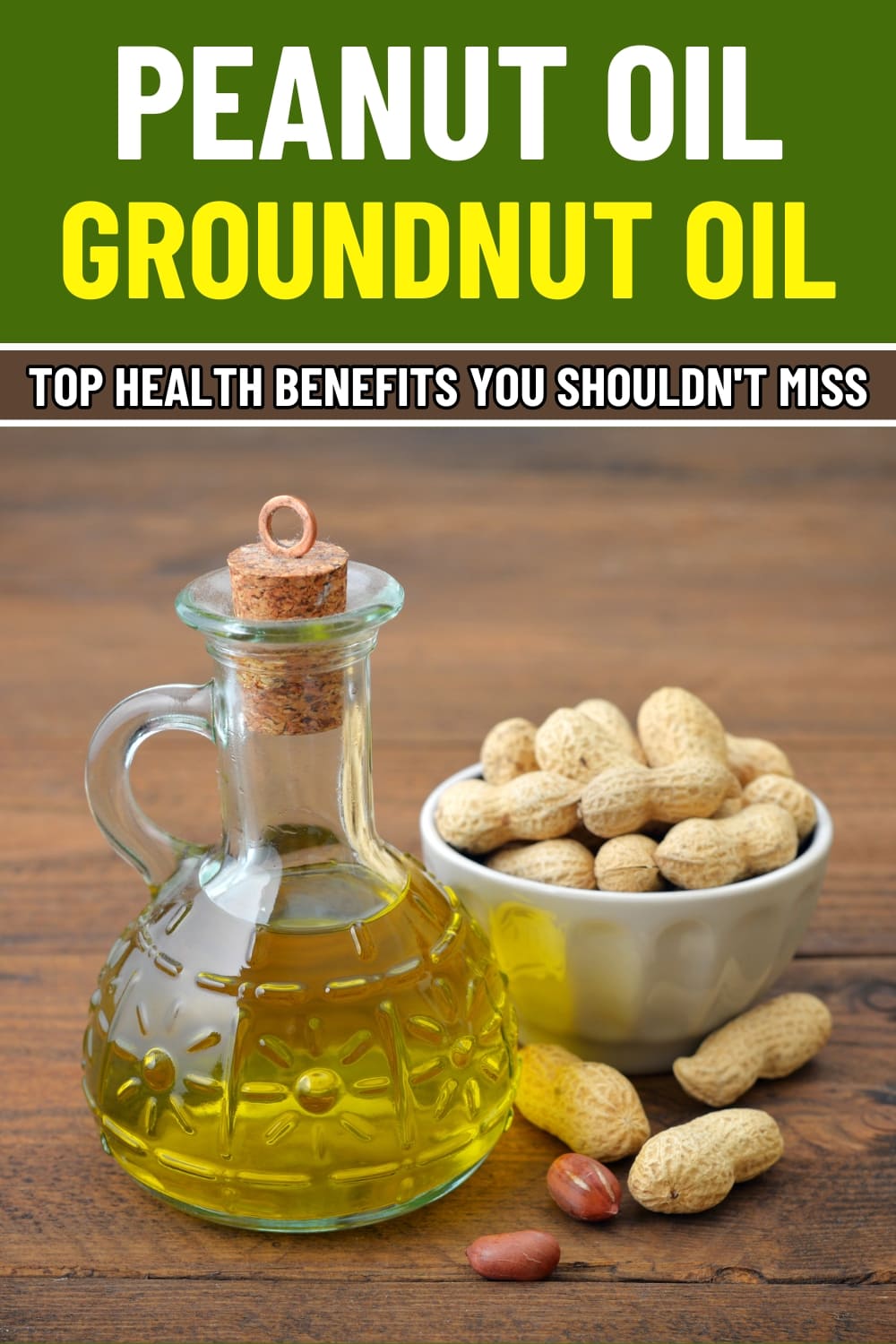Peanut oil, also known as groundnut oil, is a vegetable-derived oil made from the seeds of the peanut plant (Arachis hypogaea).
Originating in South America, peanut oil has been widely used for cooking due to its high smoke point and mild flavor.
This oil is not only versatile in the kitchen but also offers numerous health benefits. But is peanut oil the healthiest choice for your cooking?
Let’s explore its potential benefits and how to incorporate it into your daily routine for a healthier lifestyle.
Nutritional Profile of Peanut Oil
Peanut oil is nutrient-rich and contains a variety of healthy fats, vitamins, and minerals. Here is the nutritional breakdown of one tablespoon (about 14 grams) of peanut oil:
- Calories: 119 kcal
- Saturated Fat: 2.3 g
- Monounsaturated Fat: 6.2 g
- Polyunsaturated Fat: 4.3 g
- Vitamin E: 1.5 mg (about 11% of the recommended daily value)
As you can see, peanut oil is high in fat, but it contains a good balance of healthy monounsaturated and polyunsaturated fats, which have been shown to support heart health.
The oil is also rich in vitamin E, a potent antioxidant that helps protect your cells from oxidative damage.

Health Benefits of Peanut Oil
1. Boosts Immune Function
The antioxidants in peanut oil, particularly vitamin E, help protect the body from free radicals and support immune function.
A tablespoon of peanut oil provides about 11% of your daily recommended intake of vitamin E. Regular consumption of peanut oil can improve immune responses and protect against infections.
Additionally, the high levels of vitamin E contribute to overall health by enhancing the immune system’s ability to fight off illnesses.

2. Supports Heart Health
Peanut oil contains a healthy balance of fats monounsaturated and polyunsaturated fats, which have been shown to improve heart health.
Specifically, oleic acid (a monounsaturated fat) and linoleic acid (an omega-6 polyunsaturated fat) help lower LDL (bad) cholesterol and increase HDL (good) cholesterol levels.
Research from the American Heart Association has shown that replacing saturated fats with unsaturated fats, such as those found in peanut oil, can reduce the risk of heart disease by 30%.
Additionally, peanut oil’s high levels of vitamin E help protect the arteries from oxidative damage and support cardiovascular function.

3. Improves Blood Sugar Control
Peanut oil is also beneficial for people managing diabetes. It has been shown to improve insulin sensitivity, which helps regulate blood sugar levels.
Studies have found that the monounsaturated and polyunsaturated fats in peanut oil, particularly oleic acid, can slow the absorption of sugars in the digestive tract, resulting in better blood sugar control.
In a review of 102 clinical studies, replacing just 5% of saturated fat intake with polyunsaturated fats led to a significant reduction in blood sugar levels and HbA1c, a marker of long-term blood sugar control.
This makes peanut oil a good choice for those looking to improve their blood sugar control naturally.

4. Supports Weight Loss
Peanut oil is a good source of healthy fats that can help keep you full and satisfied after meals. It can be a part of a balanced diet that promotes healthy weight loss.
The monounsaturated fats in peanut oil are less likely to be stored as fat in the body compared to trans fats and saturated fats.
A study published in The American Journal of Clinical Nutrition (2004) found that replacing saturated fats with monounsaturated fats helped reduce body fat and promote weight loss.
5. Supports Healthy Skin and Hair
The antioxidants in peanut oil, combined with its vitamin E content, can help nourish your skin and hair. Vitamin E is known for its ability to hydrate the skin, repair damage, and reduce the appearance of scars.
Regular use of peanut oil can help protect your skin from environmental damage, such as UV radiation and pollution, and can be particularly helpful in the colder months when your skin tends to become dry.
The oil can also be massaged into the scalp to promote hair health. It helps strengthen hair follicles, reduce dandruff, and improve overall scalp health, making it an ideal ingredient in natural hair care treatments.

6. May Help Prevent Cancer
The high levels of antioxidants, particularly vitamin E, in peanut oil can help reduce oxidative stress in the body. Oxidative stress is a known contributor to cancer development, as it can cause DNA damage and lead to the mutation of cells.
By incorporating peanut oil into your diet, you may be able to reduce the risk of developing certain cancers, such as breast and prostate cancer.
A study published in the Journal of Clinical Biochemistry and Nutrition (2014) found that regular consumption of peanut oil may help reduce oxidative damage and lower the risk of developing cancer.
How to Use Peanut Oil
- Frying: Thanks to its high smoke point of 437°F (225°C), peanut oil is ideal for frying foods like chicken, vegetables, and potatoes.
- Stir-frying: The mild flavor of peanut oil makes it a great choice for stir-fries, where you need high heat and a neutral taste.
- Salad dressings: If you prefer a milder taste, use refined peanut oil in homemade salad dressings.
- Baking: Substitute peanut oil for butter or other oils in baking recipes to add a bit of extra nutrition.

Cautions and Precautions
People with peanut allergies should avoid unrefined peanut oil, as it may trigger an allergic reaction. However, refined peanut oil is usually safe for those with peanut allergies because it undergoes a process that removes allergens.
Peanut oil is rich in omega-6 fatty acids, which can contribute to inflammation when consumed in excess. Aim to balance omega-6 consumption with omega-3-rich foods like fatty fish, flaxseeds, and walnuts.
Peanut oil is prone to oxidation due to its high content of polyunsaturated fats. Store peanut oil in a cool, dark place to prevent it from becoming rancid.
Disclaimer
This article is for informational purposes only and should not be considered a substitute for professional medical advice.
Always consult your healthcare provider before making significant changes to your diet, especially if you have existing health conditions or are taking medication.

Is Peanut Oil the Right Choice for Your Health? The Truth Revealed
